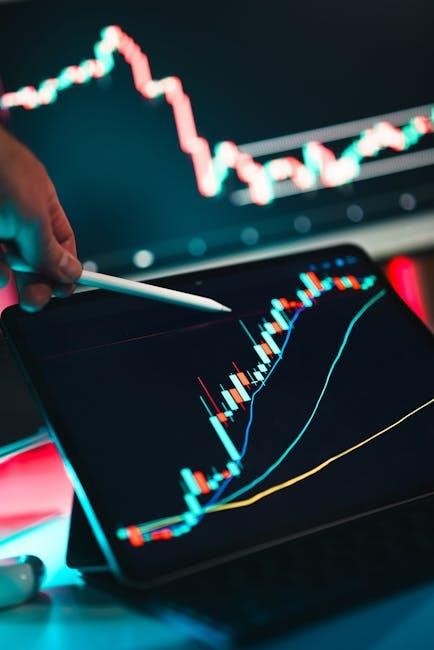Economics is a social science that studies how individuals and societies make decisions about using scarce resources to fulfill wants and needs. It examines the efficient allocation of resources‚ production‚ and consumption‚ providing insights into how economic systems function. By understanding economics‚ one can analyze how societies address scarcity and make optimal choices to improve living standards. This field is essential for critical thinking about real-world economic challenges and opportunities.
1.1. Definition of Economics
Economics is a social science that studies how individuals‚ households‚ firms‚ and governments allocate scarce resources to satisfy their unlimited wants. It examines the production‚ distribution‚ and consumption of goods and services‚ focusing on the efficient allocation of resources to meet human needs. Economics explores how societies address scarcity‚ the fundamental problem of having unlimited desires but limited resources. By analyzing choices and trade-offs‚ economics provides insights into how to make optimal decisions at individual and societal levels‚ aiming to improve living standards and overall well-being.
1.2. Importance of Studying Economics
Studying economics is essential for understanding how societies allocate resources‚ make decisions‚ and address challenges like scarcity and inequality. It equips individuals with critical thinking skills to analyze real-world problems‚ such as inflation‚ unemployment‚ and global trade. Economics helps identify how to optimize resource use‚ make informed decisions‚ and evaluate the impact of policies. By learning economic principles‚ one gains insights into personal finance‚ market dynamics‚ and the broader economy. This knowledge empowers individuals to engage in meaningful discussions about economic issues and contribute to creating a more prosperous and sustainable future. Understanding economics is vital for navigating both personal and societal challenges effectively.
Key Concepts in Economics
Economics revolves around scarcity‚ opportunity cost‚ and the allocation of resources to meet wants and needs. These concepts form the foundation for understanding economic decision-making and systems.
2.1. Scarcity and Opportunity Cost
Scarcity refers to the fundamental economic problem of having unlimited wants but limited resources to satisfy them. This universal challenge requires making choices. Opportunity cost‚ a key concept‚ represents the value of the next best alternative forgone when a decision is made. For example‚ choosing to invest in education means sacrificing potential earnings from working. Understanding scarcity and opportunity cost helps individuals and societies allocate resources efficiently‚ prioritizing needs over wants and making informed trade-offs. These principles are central to economic decision-making‚ emphasizing the real or economic cost of choices in a world of limited resources.
2.2. Resources and Their Allocation
Resources are the inputs used to produce goods and services‚ categorized into natural (like land‚ water)‚ human (labor)‚ capital (machinery‚ buildings)‚ and technological (knowledge‚ innovation). Effective allocation of these resources is crucial to meet the demands of individuals and societies‚ ensuring maximum productivity and satisfaction. Economic systems‚ such as market economies or planned economies‚ determine how resources are distributed‚ often balancing individual choices with societal needs. The challenge lies in optimizing resource allocation to achieve economic efficiency and equity‚ addressing both present and future requirements while minimizing waste and ensuring sustainable development.

Branches of Economics
Economics is divided into microeconomics and macroeconomics. Microeconomics studies individual decisions and market mechanisms‚ while macroeconomics examines broader economic factors like growth and inflation. International trade economics focuses on global exchanges‚ shaping economic systems and policies worldwide.
3.1. Microeconomics
Microeconomics is a branch of economics that studies individual economic units‚ such as households‚ firms‚ and markets; It examines how these entities make decisions about resource allocation‚ production‚ and pricing. Key concepts include supply and demand‚ consumer behavior‚ and cost curves. Microeconomics focuses on understanding how prices are determined and how resources are distributed among competing uses. It also analyzes market structures‚ such as perfect competition and monopoly‚ to evaluate efficiency and outcomes. By examining smaller economic phenomena‚ microeconomics provides insights into the functioning of individual components of the economy‚ helping to explain how they contribute to broader economic systems and decision-making processes.
3.2. Macroeconomics
Macroeconomics examines the economy on a large scale‚ focusing on national income‚ economic growth‚ and inflation. It studies factors influencing the overall economy‚ such as government policies‚ global events‚ and technological changes. Key concepts include GDP‚ unemployment rates‚ and fiscal policy. Macroeconomics aims to understand economic fluctuations‚ such as booms and recessions‚ and how to stabilize them. It also explores international trade and financial systems. By analyzing these broader trends‚ macroeconomics provides insights into improving living standards and addressing economic challenges like inflation and unemployment. This field is crucial for developing policies that promote sustainable economic development and global prosperity. Its applications are vital for shaping economic strategies worldwide.
3.3. International Trade and Economics
International trade and economics examines how countries exchange goods‚ services‚ and resources across borders. It focuses on the benefits of specialization and comparative advantage‚ enabling nations to produce goods more efficiently. Key concepts include imports‚ exports‚ and trade balances. This field also explores the impact of global trade on economic growth‚ employment‚ and income distribution. Challenges such as trade imbalances‚ tariffs‚ and political tensions are analyzed. International institutions like the WTO and IMF play a crucial role in regulating global trade. Understanding international trade is essential for addressing issues like globalization‚ economic interdependence‚ and the integration of national economies into the global market system. It shapes policies affecting global prosperity and development.

Economic Systems and Theories
Economic systems and theories explore how societies organize production‚ distribution‚ and consumption of goods and services. Key systems include capitalism‚ socialism‚ and mixed economies. Theories like classical and Keynesian economics shape understanding of market behavior‚ government intervention‚ and economic stability. These frameworks guide policymakers in addressing challenges such as inequality‚ inflation‚ and growth‚ providing tools to analyze and predict economic outcomes. Understanding these systems and theories is crucial for developing strategies to achieve sustainable economic development and prosperity. They form the foundation for addressing real-world economic issues and shaping policy decisions.
4.1. Types of Economic Systems
Economic systems are frameworks that organize production‚ distribution‚ and consumption of goods and services. The primary types include capitalism‚ socialism‚ and mixed economies. Capitalism is market-driven‚ emphasizing private ownership and free enterprise. Socialism relies on government ownership and central planning to allocate resources. Mixed economies combine elements of both‚ balancing private enterprise with government intervention. Other systems include traditional economies‚ based on customs and inheritance‚ and command economies‚ where the state controls all economic activities. Each system addresses how societies allocate resources‚ manage ownership‚ and achieve economic goals. Understanding these systems provides insights into how different nations organize their economies to address scarcity and meet societal needs effectively.
4.2. Classical and Keynesian Economic Theories
Classical economic theory‚ led by Adam Smith‚ emphasizes free markets‚ individual self-interest‚ and the “invisible hand” that guides economic activity. It assumes markets self-regulate and achieve equilibrium. Keynesian economics‚ developed by John Maynard Keynes‚ focuses on government intervention to stabilize economies during crises. Keynesians argue that aggregate demand drives economic growth and that government spending and monetary policy can mitigate recessions. While classical economists prioritize laissez-faire principles‚ Keynesians advocate for active policy measures. These contrasting theories shape economic thought and policy‚ addressing issues like unemployment‚ inflation‚ and economic stability. Understanding both perspectives is crucial for analyzing real-world economic challenges and forming effective policies to address them.

The Economics of Resources
The economics of resources explores how societies allocate scarce resources to meet unlimited needs. It examines the efficient distribution of land‚ labor‚ capital‚ and entrepreneurship to maximize productivity and prosperity.
5.1. Factors of Production
The factors of production are the resources used to create goods and services‚ traditionally classified into four categories: land‚ labor‚ capital‚ and entrepreneurship. Land includes natural resources like raw materials and minerals. Labor refers to human effort and skills. Capital involves financial resources and produced goods used in production‚ such as machinery and factories. Entrepreneurship is the ability to organize and manage resources to generate profit. These factors are essential for economic activity‚ as they determine how efficiently resources are allocated to meet societal needs and drive economic growth. Understanding these factors is crucial for analyzing production processes and economic systems.
5.2. Resource Allocation and Efficiency
Resource allocation refers to the distribution of scarce resources among competing uses to maximize efficiency and meet societal demands. Economic efficiency occurs when resources are used to produce the optimal mix of goods and services‚ minimizing waste. Achieving efficiency involves balancing production costs and benefits while ensuring resources are allocated to their most valuable uses. This process is critical in addressing scarcity and improving living standards. Efficient resource allocation also considers opportunity costs‚ ensuring that alternatives are evaluated to make informed decisions. By optimizing resource use‚ economies can enhance productivity and sustainability‚ ultimately benefiting individuals and society as a whole.

Practical Applications of Economics
Economics applies to everyday life through personal finance and decision-making. It helps individuals and businesses manage resources‚ analyze market trends‚ and understand the impact of economic policies on society.
6.1. Personal Finance and Decision-Making
Economics plays a crucial role in personal finance and decision-making. Understanding scarcity and opportunity cost helps individuals make informed choices about saving‚ investing‚ and spending. By analyzing trade-offs‚ people can allocate their income effectively to achieve financial goals. Economics provides tools to evaluate risks and rewards‚ enabling smarter decisions about debt management‚ credit use‚ and long-term planning. It also aids in understanding market trends‚ which is vital for investments. Applying economic principles can lead to better financial stability and security‚ ensuring that resources are used efficiently to meet both short-term needs and long-term aspirations.
6.2. Real-World Examples of Economic Principles
Economic principles are evident in everyday life‚ shaping decisions and outcomes. For instance‚ the concept of supply and demand influences prices in markets‚ such as how a shortage of housing increases property values. Opportunity cost is seen when individuals choose between working overtime or spending time with family. Governments apply economic theories through policies like taxation and subsidies. Businesses use pricing strategies based on elasticity of demand to maximize profits. Even personal choices‚ like budgeting or investing‚ reflect economic reasoning. These examples illustrate how economic concepts are practical and relevant‚ helping individuals and societies make informed decisions to allocate resources effectively.
Economics is essential for understanding decision-making processes‚ addressing scarcity‚ and efficiently allocating resources. It provides foundational knowledge for analyzing real-world challenges and improving societal well-being.
7.1. Summary of Key Points
Economics is a social science that studies how individuals and societies allocate scarce resources to meet unlimited wants and needs. It examines production‚ consumption‚ and distribution‚ focusing on efficiency and decision-making. Key concepts include scarcity‚ opportunity cost‚ and the allocation of resources. The field is divided into microeconomics (individual markets) and macroeconomics (economy-wide issues). Understanding economics helps analyze real-world challenges‚ such as inflation‚ unemployment‚ and economic growth. By studying economics‚ individuals gain insights into how markets function‚ how policies impact societies‚ and how to make informed decisions in personal finance and global trade. Economics provides a framework for addressing complex problems and improving living standards.
7.2. The Relevance of Economics in Everyday Life
Economics influences daily life through decision-making about resources‚ budgeting‚ and financial planning. Understanding economic principles helps individuals make informed choices about spending‚ saving‚ and investing. Concepts like opportunity cost and scarcity explain trade-offs in everyday decisions‚ such as choosing between leisure and work or saving for future needs. Economics also sheds light on how prices‚ inflation‚ and employment trends affect personal finances. By grasping economic fundamentals‚ people can navigate financial challenges more effectively‚ making economics an essential tool for improving quality of life and achieving long-term goals. Its practical applications ensure that economics remains a vital part of everyday decision-making processes.
